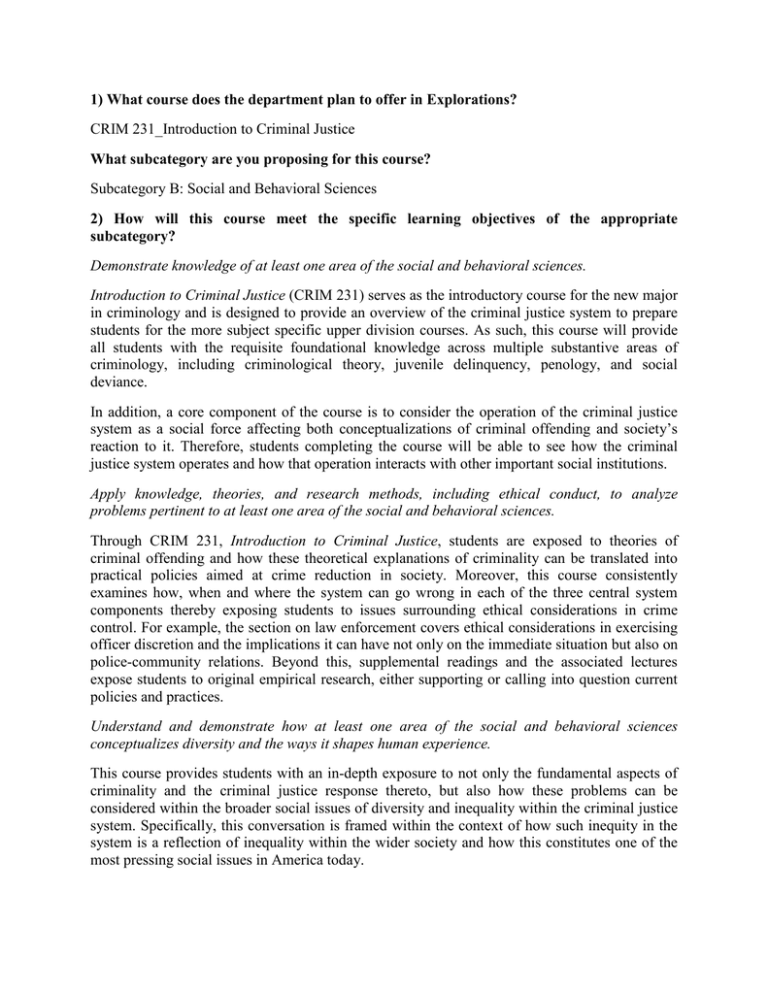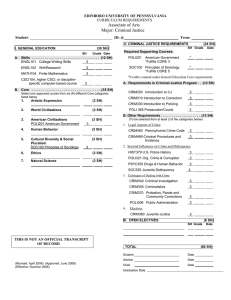1) What course does the department plan to offer in... What subcategory are you proposing for this course?
advertisement

1) What course does the department plan to offer in Explorations? CRIM 231_Introduction to Criminal Justice What subcategory are you proposing for this course? Subcategory B: Social and Behavioral Sciences 2) How will this course meet the specific learning objectives of the appropriate subcategory? Demonstrate knowledge of at least one area of the social and behavioral sciences. Introduction to Criminal Justice (CRIM 231) serves as the introductory course for the new major in criminology and is designed to provide an overview of the criminal justice system to prepare students for the more subject specific upper division courses. As such, this course will provide all students with the requisite foundational knowledge across multiple substantive areas of criminology, including criminological theory, juvenile delinquency, penology, and social deviance. In addition, a core component of the course is to consider the operation of the criminal justice system as a social force affecting both conceptualizations of criminal offending and society’s reaction to it. Therefore, students completing the course will be able to see how the criminal justice system operates and how that operation interacts with other important social institutions. Apply knowledge, theories, and research methods, including ethical conduct, to analyze problems pertinent to at least one area of the social and behavioral sciences. Through CRIM 231, Introduction to Criminal Justice, students are exposed to theories of criminal offending and how these theoretical explanations of criminality can be translated into practical policies aimed at crime reduction in society. Moreover, this course consistently examines how, when and where the system can go wrong in each of the three central system components thereby exposing students to issues surrounding ethical considerations in crime control. For example, the section on law enforcement covers ethical considerations in exercising officer discretion and the implications it can have not only on the immediate situation but also on police-community relations. Beyond this, supplemental readings and the associated lectures expose students to original empirical research, either supporting or calling into question current policies and practices. Understand and demonstrate how at least one area of the social and behavioral sciences conceptualizes diversity and the ways it shapes human experience. This course provides students with an in-depth exposure to not only the fundamental aspects of criminality and the criminal justice response thereto, but also how these problems can be considered within the broader social issues of diversity and inequality within the criminal justice system. Specifically, this conversation is framed within the context of how such inequity in the system is a reflection of inequality within the wider society and how this constitutes one of the most pressing social issues in America today. Integrate knowledge of at least one area of the social and behavioral sciences into the issues of personal or public importance. The American Experience increasingly incorporates crime control. With the highest incarceration rate in the world and total expenditures for the system exceeding the level of spending on either healthcare or education, crime is a pressing social problem for American society. For this reason, students must have a sound understanding of the complexities of the current system and how to apply knowledge gained through research to provide solutions to this social problem. This course will give students the ability to discuss the crime problem from a better informed perspective that allows them to see beyond stereotypes and convenient slogans. Communicate effectively using the language and terminology germane to at least one area of the social and behavioral sciences. The vernacular of the criminal justice system is widely used in everyday American society; however, few who use terms such as due process, probable cause, beyond a reasonable doubt, civil rights, etc. can offer a clear and proper definition of these terms nor do they understand the important role they play in various aspects of the system. For example, students regularly hear the term due process, but (1) cannot clearly define the concept, (2) do not understand the constitutional origins/role of due process, and (3) do not understand the role due process plays in the appellate process for the death penalty, among other correctional punishments. As stated previously, this course was created to educate students on the fundamentals of the system to better prepare them for upper division criminology courses. As such, any student who takes this course – regardless of major – will benefit from a firm understanding of these foundational concepts and their role in broader societal issues emanating from the criminal justice system. This will allow students successfully completing the course to be able to more effectively contribute to debates surrounding the crime problem in American society in a more knowledgeable and informed manner. 3) Syllabus statement of learning outcomes for the course. Upon completion of this course, students will: • Be able to discuss the origins, development, and current structure of the criminal justice system; • Understand in detail the three central components of the criminal justice system - the police, the courts and the law, and the correctional system; • Understand community and institutional responses to crime, and both formal and informal means of social control; • Understand more substantive and complicated issues associated with the criminal justice system, such as police discretion, police-community relations, expectations and limitations of the role of each agency in crime control, accountability within the system, and changing trends in the field. 4) Brief description of how the department will assess the course for these learning objectives. The department will use objective examinations to assess students’ recall ability and understanding of the course material while several writing assignments will assess students’ ability to apply and analyze the course material. These exams and assignments will be left to the discretion of the individual instructor. However, as all sections of this course, regardless of instructor, will utilize the same required textbook, there should be no substantial variation in the material students are being exposed to in meeting these learning objectives. For a more standardized measure of the learning outcomes articulated in section 2 of the Explorations proposal, all sections of the course will administer a 25 question applied, multiple choice exam within the first to second week of the course. The exam will contain 5 questions for each of the five learning objectives dictated by the Colonnade program. The exam will then be re-administered during the final week of the course. The questions will reflect the core components of the course material contained within each of the above listed learning outcomes, as decided by faculty teaching the course. This format will allow faculty to gauge what objectives are not being adequately addressed in class and modify their instruction accordingly. While the primary purpose of this measure (administered to every section of the course) is to evaluate the ability of the course to achieve the stated Colonnade objectives, each individual instructor will also be permitted to use the measure as part of 1) the course requirements, 2) extra credit, or 3) factor into the student’s grade in any other manner the instructor chooses. 5) How many sections of this course will your department offer each semester? The Department of Sociology will offer 1-2 sections of the course per semester that will be open to non-majors. This course is also offered through Independent Learning and is offered regularly online during the summer term. 6) Please attach a sample syllabus for the course. SOCL 231.001 – INTRODUCTION TO CRIMINAL JUSTICE SPRING 2012 Meeting Time: MWF 10:20 to 11:15 Room: GH 0138 Professor: XXXX Office Hours: Mon. & Wed. 1:30 to 3:30PM; Fri. 1:30 to 2:30PM Office: Sociology Dept. - #xxx Email: instructor@wku.edu Office Phone: 270-745-xxxx COURSE OBJECTIVE: The objective of this course is to provide an overview of the origins, development, structure, and contemporary issues facing the criminal justice system and its role in the societal response to crime. This course is designed to prepare students for upper level criminology or related courses pertaining to penology, victimology, and law by providing an introduction to the most fundamental concepts of the overall system. In this course will explore such topics as social control in American society, the history and origins of the law, law enforcement, and corrections, and the reasons why some members of society break the law. The majority of the course will focus on the three central components of the criminal justice system – the police, the courts and the law, and the correctional system – and the core issues within each field. In addition, we will examine other aspects of the system such as the juvenile system and contemporary issues facing the criminal justice system in the 21st century. Due to the amount of material that we will be covering, we will simply be surveying these topics to provide students with a firm understanding of the core concepts and issues in the criminal justice system. This course will provide students with a well-rounded understanding of these issues and encourage you to further explore areas of interest to you. LEARNING OUTCOMES: Upon completion of this course, students will: • Be able to discuss the origins, development, and current structure of the criminal justice system; • Understand in detail the three central components of the criminal justice system the police, the courts and the law, and the correctional system; • Understand community and institutional responses to crime, and both formal and informal means of social control; • Understand more substantive and complicated issues associated with the criminal justice system, such as police discretion, police-community relations, expectations and limitations of the role of each agency in crime control, accountability within the system, and changing trends in the field. COURSE MATERIALS Required text (available at the university bookstore or online) Pollock, J.M. (2008). Crime & Justice in America: An introduction to criminal justice. Newark, NJ: Anderson. ATTENDANCE Attendance is mandatory. Attendance will be taken at the beginning of each class and students who are more than 15 minutes late will be marked absent for the day. If you do miss a class, YOU are responsible for obtaining the notes from another student. Students who miss more than 6 classes throughout the semester may receive a failing grade. NOTE ON TECHNOLOGY IN THE CLASSROOM Laptops may only be used for note taking (please update Facebook on your own time). Cell phones are NOT to be used during class and should remain on silent during class. Students caught using ANY type of electronic device during scheduled exams will be asked to leave the room and will receive a 0 on that exam. WRITING ASSIGNMENTS There are four writing assignments for the course - one for each section. These are intended to demonstrate that students have completed the reading and are able to competently identify and discuss the important concepts by answering the discussion questions provided. You are expected to give these assignments the attention that they deserve and show to me that you (1) understand the material, (2) have engaged in critical reflection of the issue, and (3) can integrate the concepts covered in the lectures and text with what you learn from the assignment. Each of these assignments is worth 25 points towards your final grade. The four assignments combined carry the same weight as an examination, so treat them as such! The guidelines for these assignments are available on the Blackboard course page. POLICY ON PLAGIARISM Plagiarism is representing the ideas of another as your own. Any idea, concept, statement or summary that is taken from or guided by a published source (including internet websites) must be properly cited in all writing assignments. Students are expected to conform to the highest ethical standards regarding academic integrity. Plagiarism will NOT BE TOLERATED and will be DEALT WITH MOST HARSHLY. Lack of dishonest intent does not necessarily absolve a student of responsibility for plagiarism. When in doubt – cite a source!! A computer software program – Turnitin.com – may be used to check for plagiarized material. EXAMINATIONS There will be 4 examinations for the course. The exams will consist of multiple choice, true/false, matching, and short essay questions. Each exam will be worth 100 points. FROM THE OFFICE FOR STUDENT DISABILITY SERVICES In compliance with university policy, students with disabilities who require accommodations (academic adjustments and/or auxiliary aids or services) for this course must contact the Office for Student Disability Services in Downing University Center A-200. The phone number is 745-5004; TTY is 745-3030. Per university policy, please DO NOT request accommodation directly from the professor or instructor without a letter of accommodation from the OFSDS. GRADING: Students will be graded on a point system. Students should make every effort to keep track of their grade throughout the semester and seek help if the student believes he/she is doing poorly in the course. You can do this by adding the total number of points you have achieved up to that point in the semester and divide by the number of points possible at that point in the semester: points achieved/points possible*100 = % grade. As a rule, incompletes are not given in this course. An incomplete would only be given if a student was physically incapable of completing required work due to hospitalization, incapacitation, or other extreme circumstances. Item Points Possible Exam 1 100 Exam 2 100 Exam 3 100 Exam 4 100 Writing Assignments (4 100 @ 25 points each) Total 500 Grading Scale A = 90 – 100% B = 80 – 89% C = 70 – 79% COURSE SCHEDULE *This is subject to change at the discretion of the professor. Date Topic M 01/23 Introduction to the course W 01/25 Criminal Justice as Social Control F 01/27 Same M 01/30 Same; Crime in Society W 02/01 Same Readings Covered Chapter 1 Chapter 2 F 02/03 Same; Explanations of Crime Chapter 3 M 02/06 Same W 02/08 Same F 02/10 Same; Review *Assignment #1 due M 02/13 EXAM 1 (Chapters 1-3) W 02/15 Introduction to Law Enforcement Chapter 4 F 02/17 Same; Police Operations Chapter 5 M 02/20 Same W 02/22 Same; Police and the Law F 02/24 Same M 02/27 Same W 02/29 Same; Review *Assignment #2 due F 03/02 EXAM 2 (Chapters 4-6) M 03/05 - 03/09 Spring Break - No classes M 03/12 The Juvenile System W 03/14 & F 03/16 Video M 03/19 Same; Introduction to Legal Concepts W 03/21 Same F 03/23 Same M 03/26 The Courts W 03/28 Same F 03/30 Same Chapter 6 Chapter 10 Chapter 7 Chapter 8 M 04/02 Due Process W 04/04 Same F 04/06 Same; Review *Assignment #3 due M 04/09 EXAM 3 (Chapters 7-10) W 04/11 Introduction to Corrections F 04/13 Same M 04/16 Same; Pretrial Diversion & Probations W 04/18 Same F 04/20 Same M 04/23 Prisons and Jails W 04/25 Same F 04/27 Same M 04/30 Parole & Re-Entry W 05/02 Same F 05/04 Same; Review *Assignment #4 due FINAL EXAM: Thursday, May 10 - 10:30AM to 12:30PM Chapter 9 Chapter 11 Chapter 12 Chapter 13 Chapter 14



